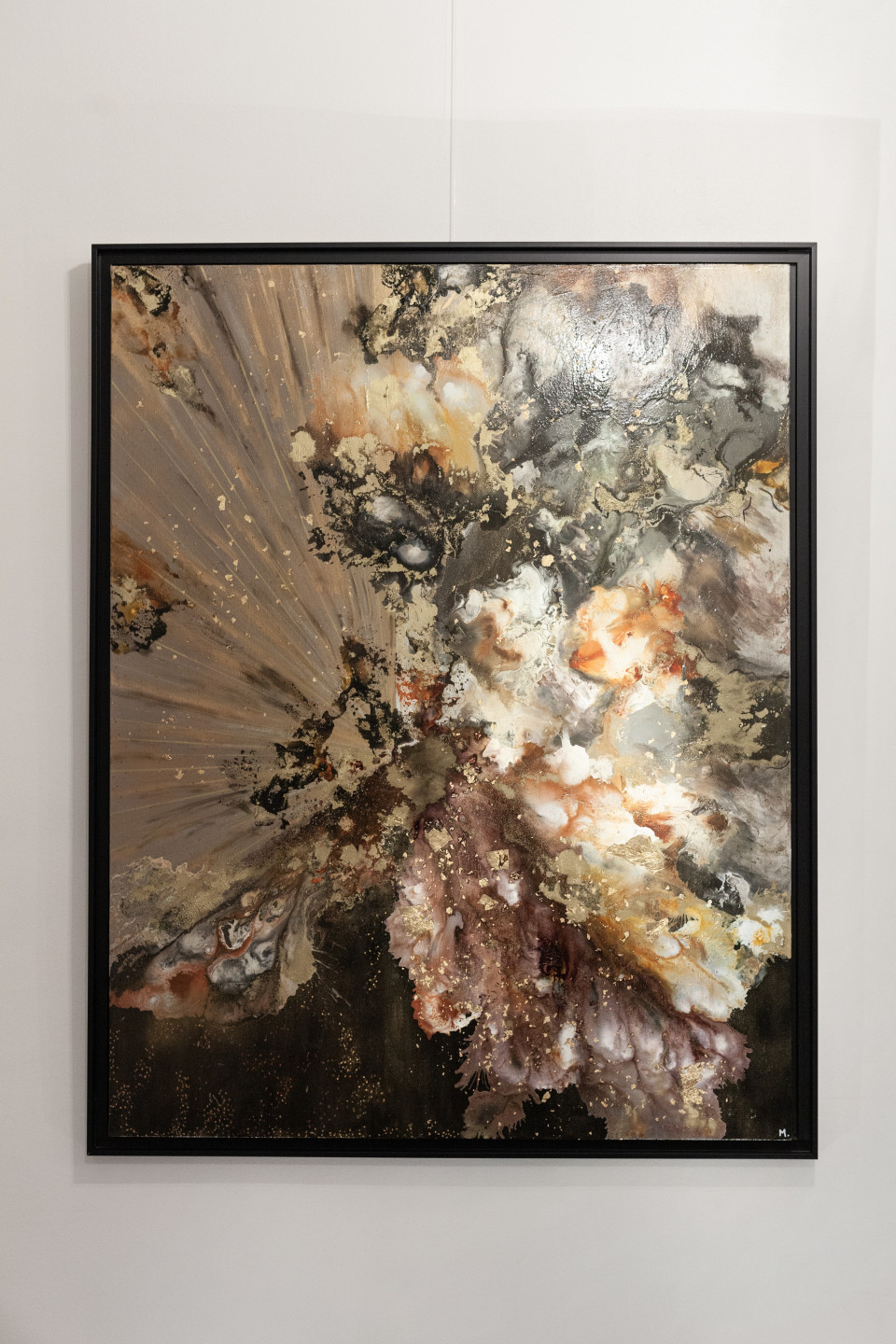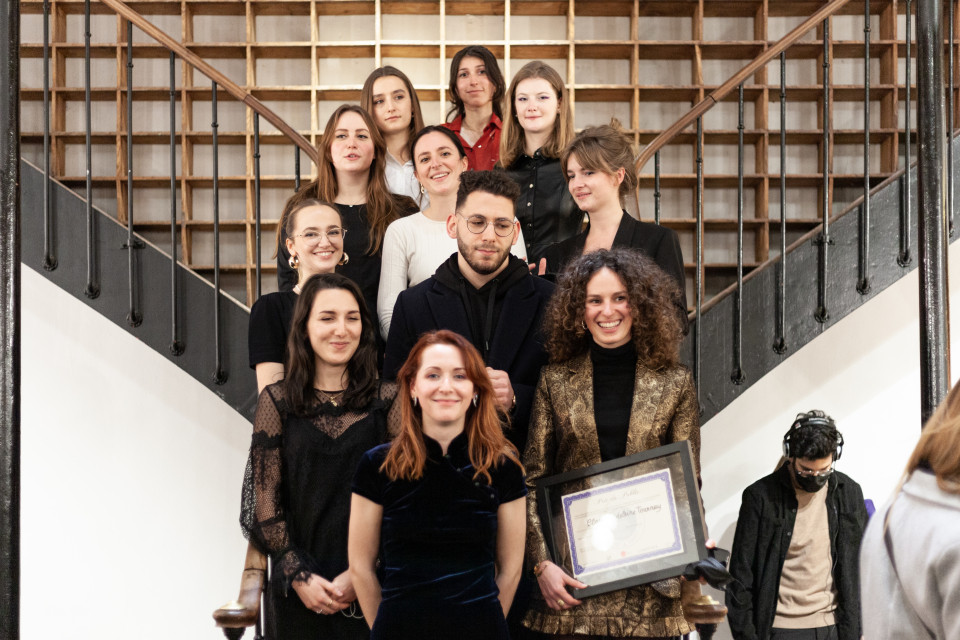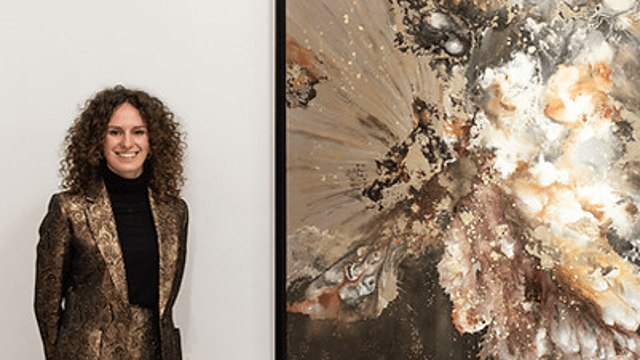Interview with Clara Madeleine Tournay (EDHEC BBA 2018), contemporary abstract artist in Paris
- Tell us about yourself.
My name is Clara Madeleine Tournay, and I’m a contemporary abstract artist based in Paris, as well as a graduate of the EDHEC International BBA programme (class of 2018), having specialized in international finance. After a 6-month internship at the end of my studies at consultancy firm EY, I wanted to pursue my education with the corporate strategy programme at ESCP Europe. I then joined Onepoint as a corporate strategy consultant.
After 3 years, I finally decided to end all that and focus on my passion: art.
- Tell us briefly how your project came about.
I’ve always been drawn to artistic courses, working with wood, clay, textiles and ceramics. For 10 years, at the same time as studying business, I took classes in sculpture and ceramics. I was fascinated by the fragmented colours of the enamel and later turned to abstract art to document the relationships between colour and the way we perceive the world around us.
During the first lockdown in March 2020, I rediscovered my passion: painting. I was able to improve my techniques and share my work on social media. I made my first sale on Instagram in May 2020, when I decided to make a living out of my passion.
- What more can you tell us about your art?
I’m a contemporary abstract painter based in Paris, and because I am self-taught, I aim to represent a snapshot of life in a painting. Through introspection of my emotions and vision of the world’s expressions, I invite my audience on an emotional experience in each of my pieces.
I have specialized in abstract expressionism and have taken inspiration from impressionism. The combination of pouring, action painting and blow painting techniques, juxtaposed with the nuances of colour, lend my canvases a hypnotic rhythm.
I work alone, and I often compare my life as an artist to that of a freelancer. I manage a business and am trying to develop it.
I am convinced that art allows humans to travel with their mind and imagination, and also that art can modify our perception of the world and of life, make people happy, sad, and give us energy or the desire to invent a story and even be the source of new encounters.

- What’s the process behind the creation of a new collection?
Before beginning a piece, I think about the message I wish to convey. Once I have my message, I look for sources of inspiration and I also work on my essays and do assemblages, sketches and colour shaders ... until I end up with a mood board that represents the broad strokes of my next collection.
I then think about the different pieces I want to produce, the order in which they should be done, as well as their importance. It’s like a puzzle whereby, after an entire collection has been put on display, you walk away with a message in your head. Each piece must fit together with the one next to it.
Next, I leave the canvas on display in my workshop, and if whenever I look at it I get the impression that something is missing, then I know I have to rework it. Often that can last months ...
- Can you explain how you apply your experience in corporate strategy to your current profession? Why is it important for you to have that background?
The prestigious path to becoming an artist in France is still Les Beaux Arts but not everyone can access it. Many passionate artists therefore turn towards alternative studies. For me, the solution was to attend a business school, while at the same time pursuing my personal endeavours on the art market as well as my creative development.
Without all of the foundations that I learned in class, on internships, abroad and in consultancy firms, I would never have been able to establish myself as an artist.
The art world remains a market – a business with investors, agents and galleries. The context is different from a consultancy firm, but ultimately the challenges are the same: how can I sell my product? How can I promote my brand? How can I expand internationally?
I’m an artist and sell artworks, but in essence I sell a product to buyers. And the bottom line is the same: I can live as an artist because at the end of the month I have a salary.
- What is your initial assessment of this entrepreneurial adventure?
It’s now been 6 months since I took the plunge and became an artist full-time. When I look back at these last few months, I see stress, moments of weakness, doubts and many failures.
But those are not the moments I will remember. What makes me want to continue as an artist is having an exhibition in a gallery, telling a story, sharing my perception of a piece, looking at people get lost in my canvas, laughing and sharing an experience with someone. It is those moments that give me the strength to pursue this adventure and the desire to paint every day.

- What advice do you have for young entrepreneurs?
Taking on the world of the arts (art, cinema, music, writing, etc.) is often a controversial decision and one received with little encouragement and plenty of doubts, but the advice I received one day – and which I have tried to share as much as possible with those around me – is this: nothing ventured, nothing gained. If you have a dream, or the desire to tackle a project that means a lot to you, then you have to allow yourself the determination to try it out. You’re going to wake up in the morning with doubts, but remember it is that self-questioning that will push you to go further. You need courage, bottle, and a lot of effort to see a project through.
I have had many discussions with students interested in becoming artists. The questions they ask themselves are often similar and linked to the mores of contemporary society. We live in a world in which there is a lot of competition, where being an artist has always been seen as a tough profession. I like to remind them that we are living in an era in which the power of networks and the speed of information exchanges can change the stakes.
My 5 years of higher education were not a “waste of time”; they allowed me to discover and acquire the necessary tools to tackle the contemporary world of art. Founding a company or becoming an artist are just two different ways of saying “entrepreneur”. I advise people to take away the best aspects of their studies and take the plunge whenever they feel ready. There is no rush, but above all one must try and challenge oneself to avoid regretting inaction later.
- What’s next for your company?
2022 will be the year in which I concentrate on developing the notoriety of my work through partners: contracts with French and European art galleries, collaboration on products with haute couture firms, contracts on the B2B market involving architects, designers, etc. One key step would be to have an artistic agent, an objective I hope to fulfil before March 2022.
I aim to develop the “artwork” branch and at the same time build my Studio Madeleine brand for the sale of derivative products.
- What are your expectations from the Alumni community?
I would like to use the network to meet people willing to share their advice on start-up entrepreneurship or the world of art. And also use the network to share my story and perhaps inspire younger people asking themselves: can my passion become my profession?
More information :
Instagram : @claratournay

Comments0
Please log in to see or add a comment
Suggested Articles



